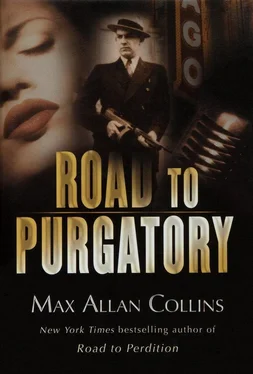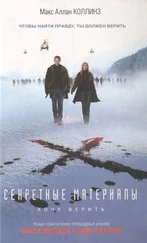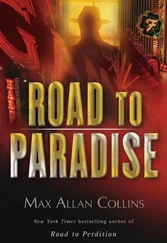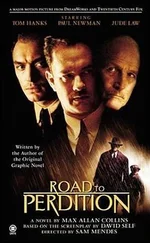“If you came to work for me,” Nitti said, “the law you would answer to would be our law. Al Capone’s law.”
“Mr. Nitti, I know all about killing the enemy. Just point the way.”
Nitti almost laughed. This sweet kid... and yet he knew from the newspapers what this young man was capable of.
“Can you drive, with one eye?” Nitti asked.
“With one eye and two arms and two feet, sure.”
“I could use a bodyguard. A loyal man who would die for me. Who would, as you say, kill for me.”
“I’m that man, Mr. Nitti.”
Nitti glanced at Campagna, who shrugged; but Louie was smiling. He, like Nitti, was amused and impressed.
“Do you have a place to stay?” Nitti asked.
“No. I came up from DeKalb. I can’t really commute, with gas rationing coming. Anyway, I’d prefer to live in town.”
“We’ll put you up at the Seneca Hotel. Lot of our people live there.”
Nitti rose. Extended his hand across the expanse of the desk.
The Enforcer and the war hero shook, after which the latter found five hundred-dollar bills left behind by the former.
“Anything else you need?” Nitti asked.
“Not that I can think of,” Michael said. “Oh!... A shoulder holster would be nice.”
The “Calumet” of Calumet City, Illinois, derived from the French word for the peace pipe once used by the Indians in these parts, long since displaced by the white people they’d bargained with. Finding something interesting to smoke in wide-open Calumet City these days would likely not be a chore. You could turn up just about anything illegal and entertaining, in this residential outgrowth of Hammond, Indiana, a (mostly) quiet hamlet of twelve thousand souls.
Quiet was how Michael Satariano, at the wheel of a ’39 Ford Deluxe coupe, found the forty-minute drive from the Loop. Tooling down Torrence Avenue about dusk, he’d had a pleasant of intermittent conversation with his companion, Louie Campagna, passing on one side of the road swimmers and boaters on Lake Calumet, and on the other side a geometric gray expanse of industry, steel mills, oil refineries, chemical works, and fertilizer factories, all disgorging dirty clouds steadily into the sky.
Then as they neared Calumet City, open spaces with wild grass greeted them, prairie land suggesting they were indeed about to enter the Wild West.
“You know, kid,” Campagna said at one point, after a long silence, “Mr. Nitti likes you.”
“Yeah?”
“You come along at a good time for the both of you — there’s people who’d like to see Frank retire, the hard way. So somebody he can trust, like you... it’s a Godsend.”
“That’s generous of you, Louie.”
“Hey. Just sayin’, keep your nose clean, please the boss, every reason to think you could go places.”
Four days had passed since Frank Nitti had hired Michael as a chauffeur-cum-bodyguard. Nitti had dismissed his other bodyguards — at least the daytime crew — and occasionally Michael was joined by Campagna in duties that consisted primarily of driving Nitti here and there, and sitting outside or sometimes inside one of the crime boss’s offices.
Nitti worked out of the Bismarck Hotel more than the Lexington, Michael soon learned; and, on nearby North Clark, held court in a booth at the Capri Restaurant. Nitti’s home in suburban Riverside was the final stop on Michael’s route. Nitti, whose wife of many years had died last year, had recently remarried, and the home was a new purchase; he had a nine-year-old son.
Campagna had commented on that, too: “He worshipped Anna.” That was Nitti’s first wife. “Hit him hard, last year... he was depressed as hell. And some people took advantage of that. But Frank’s coming on strong again. Comin’ on strong.”
Occasionally other stops were made during Michael’s daily tour of duty as Nitti’s driver, as when the ganglord sat down for a powwow with Outfit treasurer Jake Guzik, an obese creature who apparently worked strictly from a perpetually food-filled table at St. Hubert’s English Grill, near the Union League Club. Like any executive, Frank Nitti spent his time in meetings and on the phone — that the men he met with were frequently on various public enemies lists did not change the mundane nature of things.
Nitti was friendly but preoccupied, and in four days perhaps ten sentences had been exchanged between employer and new employee... until late this afternoon, when the Enforcer had summoned Michael to sit beside him on a couch in the white-appointed, gold-trimmed Victorian-looking presidential suite at the Bismarck.
“So much for challenging work, right, kid?” Nitti said good-naturedly. He was drinking milk. An attractive colored maid had provided Michael with a Coca-Cola on ice, already established in the Outfit as the war hero’s drink of choice.
“Beats tossing pizza dough,” Michael said, the nearness of Nitti unnerving him.
“But soldiering is like that, right? Hurry up and wait? Nothing happens, nothing happens, nothing happens... then bang, all hell breaks loose.”
“Is it about to?”
Nitti laughed, patted Michael on the leg. “I just wanted to watch you for a few days. Let you get used to me, so’s you could see how things go around here.”
“And size me up a little?”
“And size you up a little... Ready for a real job?”
“Give the orders, Mr. Nitti. I’ll carry them out.”
Nitti rested the milk glass on a nearby coffee table, on a coaster, then shifted on the couch, his arm on the back of the sofa; the intimate nature of the conversation should have made Michael feel more relaxed, and didn’t.
“You see, Michael, because you’re Sicilian, you have the potential to go a long way. Hey, don’t get me wrong — we ain’t biased against nobody. A good earner is a good earner. You met Guzik the other day — he’s a Jew, but what the hell do we care? He’s smart, so he’s one of our top people.”
“That’s the American way,” Michael said, hoping no irony showed through.
“It is. It’s what you fought for. Still, blood is blood, and we Sicilians run this business. To be more than an errand boy, though, you need to be a ‘made’ man.”
“I don’t understand.”
Nitti shrugged. “Here again, it’s a blood thing. When you’ve taken a life, in the line of duty, you’ll be in a position to be made. Invited inside. It’s that simple.”
“Who do you want me to kill?”
Nitti sat there, frozen, for a few moments, then said, “Kid, I was just... filling you in. You understand, we don’t attract heat no more. One of the reasons Al had to go away was he attracted heat. Too many shootings on public streets, in the subway, red splashed all over the headlines.”
“Sounds like it’s hard to get ‘made,’ then.”
“It may take time. Years. But we’re not the Cub Scouts. Now and then, here and there, the knife and the gun, we turn to them. There are disloyal people who have to be... weeded out. There are scores that need to be settled, examples that need to be made. We’re just more discreet about it than in Al’s heyday.”
“How does Mr. Capone feel about retirement? If you don’t mind my asking.”
Nitti shook his head. “He’s not retired, kid. He’s still the boss. I run things, but with his approval. Don’t ever forget that.”
“I won’t.”
“Now... Like I was sayin’, I do have a little job for you. It could get rough... I don’t think so, but it could, and it’s possible things might get messy.”
“I’ll be fine.”
“Any case, Louie will be there to back you up. Also, we have the local cops in our pocket, so even if things get good and goddamn messy, you’re in the clear. Understood?”
Читать дальше












